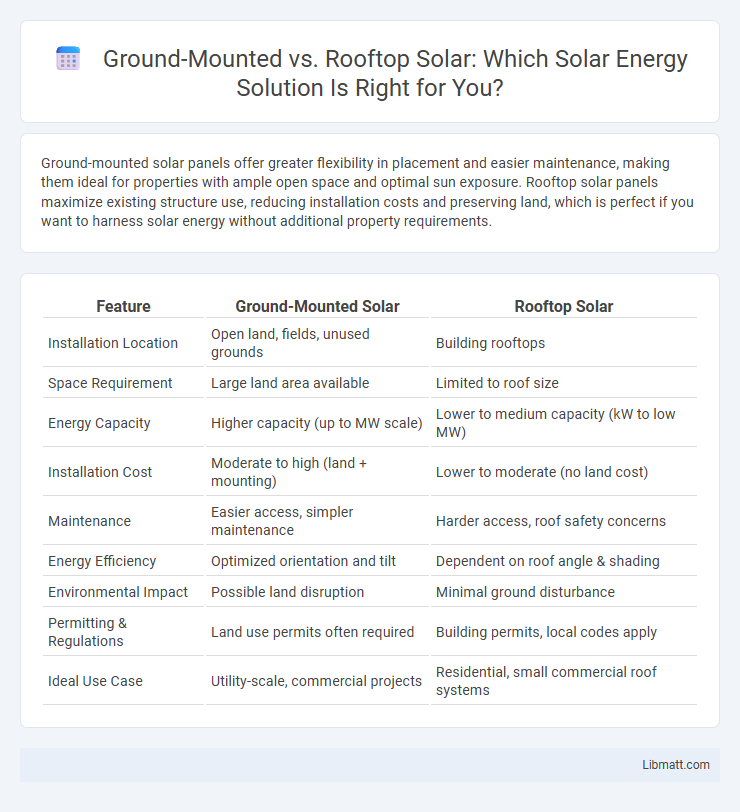Ground-mounted solar panels offer greater flexibility in placement and easier maintenance, making them ideal for properties with ample open space and optimal sun exposure. Rooftop solar panels maximize existing structure use, reducing installation costs and preserving land, which is perfect if you want to harness solar energy without additional property requirements.
Table of Comparison
| Feature | Ground-Mounted Solar | Rooftop Solar |
|---|---|---|
| Installation Location | Open land, fields, unused grounds | Building rooftops |
| Space Requirement | Large land area available | Limited to roof size |
| Energy Capacity | Higher capacity (up to MW scale) | Lower to medium capacity (kW to low MW) |
| Installation Cost | Moderate to high (land + mounting) | Lower to moderate (no land cost) |
| Maintenance | Easier access, simpler maintenance | Harder access, roof safety concerns |
| Energy Efficiency | Optimized orientation and tilt | Dependent on roof angle & shading |
| Environmental Impact | Possible land disruption | Minimal ground disturbance |
| Permitting & Regulations | Land use permits often required | Building permits, local codes apply |
| Ideal Use Case | Utility-scale, commercial projects | Residential, small commercial roof systems |
Introduction to Ground-Mounted and Rooftop Solar
Ground-mounted solar systems are installed on specialized racks placed directly on the ground, offering flexibility in positioning to maximize sunlight exposure, while rooftop solar panels are mounted on existing building roofs, utilizing available space without requiring additional land. Ground-mounted setups typically accommodate larger arrays and allow easier maintenance, whereas rooftop systems capitalize on existing infrastructure, making them suitable for urban environments. Your choice depends on factors like available space, budget, and energy needs, with each option presenting distinct advantages in solar energy deployment.
Key Differences Between Ground-Mounted and Rooftop Solar
Ground-mounted solar systems are installed on the ground, offering greater flexibility in panel placement, easier maintenance, and scalability for larger energy production, while rooftop solar panels utilize existing roof space, making them ideal for properties with limited land area. Ground-mounted arrays typically achieve higher efficiency due to optimal angling and reduced shading, whereas rooftop solar depends on roof orientation, shade, and structural integrity. Your choice between these two solar installation types should consider available space, budget, energy goals, and site-specific conditions to maximize solar power generation.
Installation Requirements and Site Considerations
Ground-mounted solar systems require ample open space with stable soil and minimal shading, ideal for properties with sufficient land area and flexible positioning. Rooftop solar installations depend on roof size, orientation, structural integrity, and shading from nearby objects, making them suitable for urban or space-limited environments. You should evaluate your site's available space, structural support, and sun exposure to determine the most efficient and practical solar setup.
Cost Breakdown and Financial Incentives
Ground-mounted solar systems typically incur higher upfront costs due to land preparation, mounting structures, and more extensive wiring compared to rooftop installations, which leverage existing building infrastructure. Financial incentives such as federal Investment Tax Credits (ITC) apply to both types, but some states offer additional rebates or grants favoring ground-mounted systems because of larger scale potential. Understanding the detailed cost breakdown and available local incentives can significantly enhance return on investment for either solar setup.
Energy Efficiency and System Performance
Ground-mounted solar systems typically offer higher energy efficiency due to optimal panel positioning and cooling, which enhances system performance by reducing heat-related losses. Rooftop solar installations face constraints in orientation and shading, potentially limiting energy output and efficiency compared to ground-mounted arrays. System performance for ground-mounted setups benefits from easier maintenance access, allowing for better cleaning and monitoring that sustains peak energy production.
Space Utilization and Land Availability
Ground-mounted solar systems maximize energy production by utilizing open land areas, making them ideal for properties with ample space and limited rooftop area. Rooftop solar panels optimize existing structures without requiring additional land, perfect for urban environments where land availability is constrained. Your choice depends on balancing available land resources with energy goals and site-specific constraints.
Maintenance and Accessibility
Ground-mounted solar panels offer easier maintenance and superior accessibility due to their installation at ground level, allowing for regular cleaning, inspection, and repairs without the need for specialized equipment. Rooftop solar panels, while space-efficient, present challenges in accessibility that can increase maintenance difficulty and costs because of height and roof design constraints. Choosing ground-mounted systems can reduce downtime and ensure optimal panel performance through more straightforward maintenance procedures.
Environmental Impact and Landscaping
Ground-mounted solar systems tend to have a larger environmental footprint due to land use, potentially disrupting natural habitats and local ecosystems, while rooftop solar panels utilize existing structures, minimizing land disturbance. Your choice between ground-mounted and rooftop solar should consider the impact on local landscaping; ground installations may require vegetation clearance and soil alteration, whereas rooftop panels preserve green space and can even reduce building heat absorption. Evaluating the balance between energy needs and environmental preservation is vital for sustainable solar adoption.
Scalability and Future Expansion
Ground-mounted solar systems offer greater scalability and easier future expansion due to ample space availability and flexible installation options, making them ideal for large-scale energy production projects. Rooftop solar panels are limited by existing roof size and structural capacity, restricting expansion potential and posing challenges for increased energy output over time. Choosing ground-mounted solutions supports long-term scalability and adaptability for growing energy demands.
Choosing the Best Solar Solution for Your Needs
Ground-mounted solar systems provide flexible installation options and easier maintenance, ideal for properties with ample space and unobstructed sunlight. Rooftop solar panels maximize underutilized roof areas, reducing land use while directly powering your home or business. Assessing your property layout, budget, and energy goals will help you choose the most efficient and cost-effective solar solution for your needs.
Ground-mounted vs Rooftop solar Infographic

 libmatt.com
libmatt.com